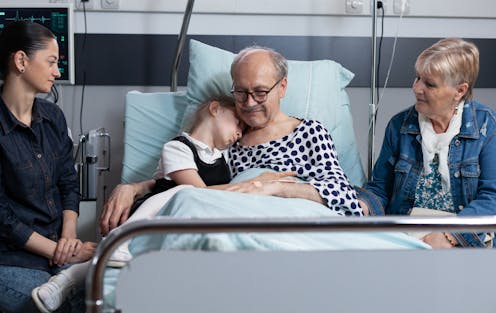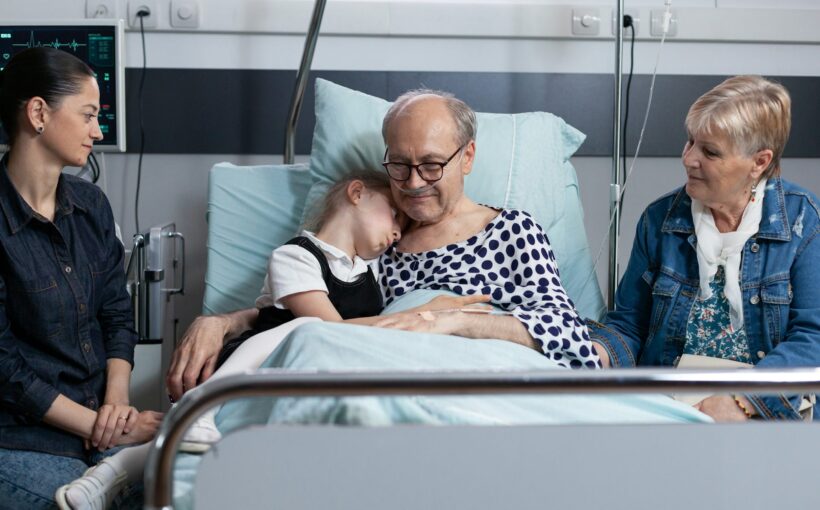
Living with chronic illness in the family is hard. It’s even harder if you know that the person you love will get worse and won’t recover from their condition. Sadly, it can happen to any family at any time. Anyone – a grandparent, parent, sibling or partner – can develop illness or disability.
When this happens, the wellbeing of the whole family will be affected. Rather than look at each family member as an individual, systemic therapists see the family as a “system”, or collection of individuals – each having an effect on the others. It can help each person through the grief process if they understand they are a part of a unit.
Psychiatrist John Rolland has proposed looking at family experiences of illness as a timeline – from the first signs of illness and receiving a diagnosis, through to the patient (with their family around them) managing the condition. As a counsellor, I have found it can help my clients, who may be caught up in the present of a diagnosis or illness, to stand back and see this bigger picture.
Different factors affect how families (and their members) cope with illness. If the family culture is largely closed to outsiders, the illness may be a secret, with friends, neighbours and even professionals excluded. Open families will typically find it much easier to seek help.
The nature of the illness will also make a difference. Is it chronic – usually not interfering with daily life but punctuated by flareups and regular emergencies, such as cystic fibrosis or severe asthma? Is it going to progressively worsen, like motor neurone disease, Huntington’s disease, Parkinson’s and dementia?
Does it have an unpredictable pattern like cancer, which, caught early enough, often renders it survivable, but with horrendous impacts on life through treatment such as chemotherapy. Or is it a condition like kidney failure, which will mean regular dialysis until a donor kidney can be found? Dialysis appointments mean restrictions on holidays and disruption to family time.
In many of these cases, there may still be a rollercoaster of good and bad news, with family members clinging to hope for a good outcome. Every condition, and its diagnosis and prognosis, will affect the whole family.
Growing up around illness
Some conditions take many years to worsen. Young adults who have embarked on life away from the family home may have been affected as children, with thoughts and feelings that linger into adulthood. If a parent’s condition surfaced during their childrens’ younger years, it may have deprived them of a role model, or exacerbated those confusing changes which are part of growing up.
A whole raft of conflicting emotions may arise when the patient is a sibling. Their sisters and brothers can feel resentment at the attention they are getting, even though rationally they understand, and might feel guilty about the resentment. It can help to talk to a health professional who will not judge these complicated feelings.
Read more: Why losing a parent when you’re a young adult is so hard
If the illness has a long trajectory like multiple sclerosis, which varies in severity from person to person and also has flareups, some family members may have been young carers, with the almost inevitable effect this can have physically, emotionally and educationally.
Again, it is natural and understandable if at times the children of someone with a chronic illness feel resentful. Guilt and anger can remain unresolved for many years, and it’s never too late to seek professional help.
Anticipatory grief
As illness progresses, there may come a time when the patient is told no more can be done, and that their treatment from now on will be palliative. This is a kind but sometimes ambiguous way of saying that they are going to die.
Not every dying person is immediately open and honest about the news. Younger children are often kept in the dark, at least at first. If, looking back, you recognise that this happened to you, it can be helpful, even long afterwards, to talk to a counsellor about your experience and the feelings you have been left with.
Once everyone knows, the whole family enters a new phase called anticipatory grief. But not every family member will act in the same way – responses will depend on their age, emotional health, and how close they are to the dying person.
Those who have researched this difficult area by interviewing affected families have concluded that most anticipatory grievers rightly and helpfully cling on to hope, while admitting to themselves that, ultimately, they are likely to lose their loved one. It can help to talk to specialist nurses about what to expect.
Nevertheless, illness isn’t always predictable and sudden deaths do occur. A patient with cancer who the family expects to die peacefully in a hospice bed can, albeit rarely, suffer a haemorrhage or embolism caused by the advance of their cancer. Like any sudden and unexpected death, this can complicate grief.
However, no two people’s grief is the same, and it is important to accept and respect the grieving style of each family member. From my long career working with those grieving the death of a loved one after a long illness, I know how important it is to allow others around you the space to grieve in their own way.
![]()
John Frederick Wilson does not work for, consult, own shares in or receive funding from any company or organisation that would benefit from this article, and has disclosed no relevant affiliations beyond their academic appointment.



